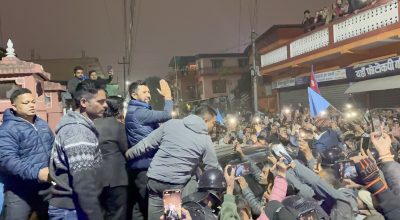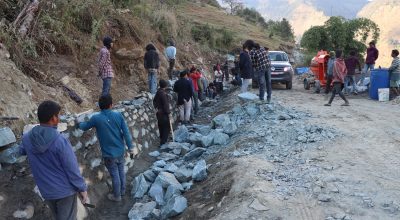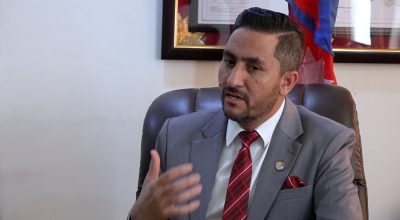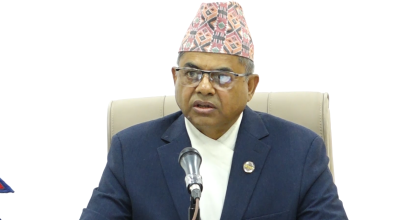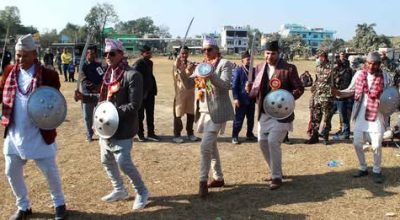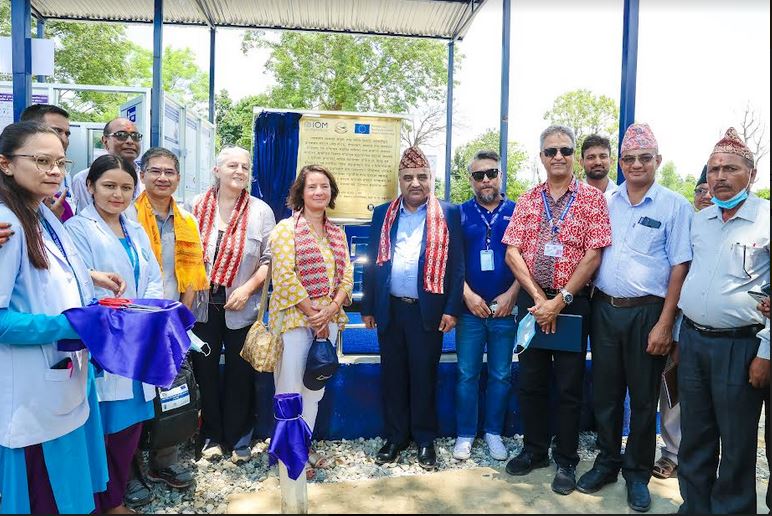
DHANGADHI : European Union Ambassador to Nepal, Nona Deprez, inaugurated the newly constructed Water, Sanitation and Hygiene (WASH), health and protection-based facilities at Gauriphanta and Gaddachauki ground crossing points of Sudurpashchim province today (18/07).
The facilities were built under the auspices of the “Effective case management by strengthening isolation centers and ground crossing points (GCPs) management for rapid response and preparedness against COVID-19” project implemented by the International Organization for Migration (IOM) under the leadership of the Nepal’s Ministry of Health and Population, financial support from the European Union Humanitarian Aid, and in implementing partnership with Save the Children and local support Nepal National Social Welfare Association.
“It is our responsibility to provide basic facilities at the border points for those thousands of Nepalese migrant workers travelling to and from India, who must undergo medical examinations, sometimes having to wait for more than three hours,” said Ambassador Deprez addressing the inauguration event.
“I am pleased that, thanks to the European Union, those facilities such as waiting room, drinking water, and bread-feeding center have been established as part of the Health Desk at the borders to facilitate a smooth health checkup for migrant workers who are contributing to sustain their households as well as to the country’s economy,” she added.
Though the data on Nepalese migrant population in India is sketchy, thousands of Nepalese migrants travel across the land borders every day for seasonal work and some for extended period of time as their livelihood strategy. COVID-19 has added additional conditions for these migrant workers crossing the border. Before these facilities were constructed, there was no sheds at the Health Desks to protect the migrants from rain or sun, no drinking water and proper toilets.
“The facilities have been designed to ensure that they are gender-sensitive and disability-friendly, making it accessible for everyone,” said Lorena Lando, IOM Chief of Mission for Nepal.
“Ultimately, we want to contribute to sustainable management and preparedness for migrant flows at each crossing point to promote safe, orderly and dignified migration,” Lando added.
The project aims to support the local and provincial governments of the of targeted six border points – Jamunaha and Krishnanagar of Lumbini, Inaruwa/Birgunj of Madhesh province, and Kakarbhitta of province 1, alongside the two aforementioned locations – in strengthening the overall management at entry points.
Similarly, health-based facilities, WASH facilities and protection mechanisms to raise awareness about human rights and easy access to immediate basic protection services, are under development at all six targeted locations.
The project is intended to address the gaps identified at ground crossing points of 1,870 kilometers long open border following the second of wave of the COVID-19 pandemic in the country in mid-2021, including low testing capacity, insufficient screening, recording and reporting of migrant movement and COVID-19 positive cases, lacking protection referral services and lacking access to isolation centers for identified positive cases.







